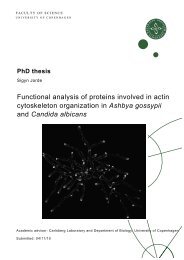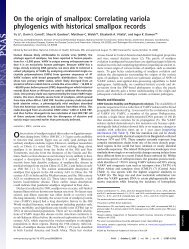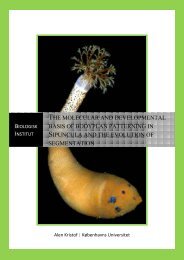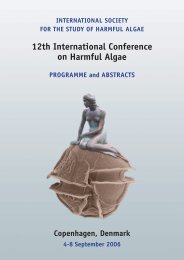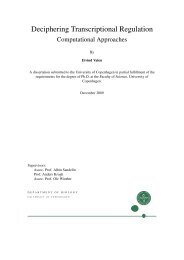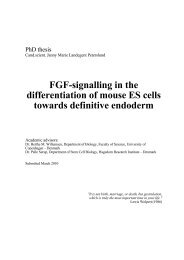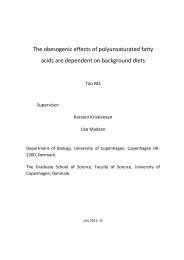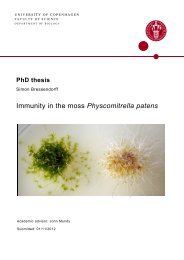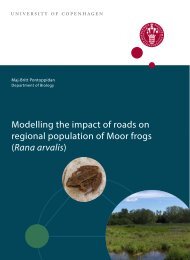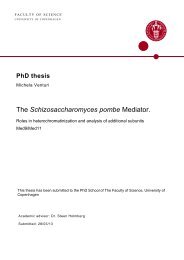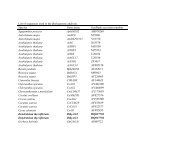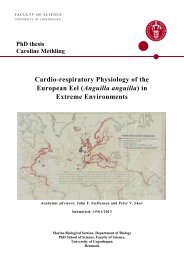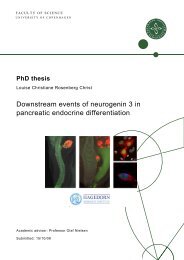Identification of important interactions between subchondral bone ...
Identification of important interactions between subchondral bone ...
Identification of important interactions between subchondral bone ...
You also want an ePaper? Increase the reach of your titles
YUMPU automatically turns print PDFs into web optimized ePapers that Google loves.
CHAPTER 7: PAPER IV<br />
Metalloproteinase and cysteine protease<br />
pr<strong>of</strong>iling in normal and Osteoarthritic cartilage<br />
Suzi Hoegh Madsen 1 , Kim Henriksen 3 , Søren Tvorup Christensen 2 , Morten Asser Karsdal 1 , and<br />
Anne-Christine Bay-Jensen 1<br />
In review in Proteome Science<br />
1 Cartilage Biology and Biomarkers R&D, Nordic Bioscience A/S, Herlev, Denmark<br />
2 Department <strong>of</strong> Molecular Biology, University <strong>of</strong> Copenhagen, Copenhagen, Denmark<br />
3 Bone Biology R&D, Nordic Bioscience A/S, Herlev, Denmark<br />
___________________________________________________________________________<br />
Abstract<br />
Treatment for cartilage degenerating diseases is either analgesic or joint replacement. Thus, the<br />
discovery and development <strong>of</strong> new treatments are needed. Proteases, such as metalloproteinases<br />
and cathepsins, play a major role in the net degradation <strong>of</strong> cartilage, and are therefore a natural<br />
target for drug development. By testing the ability <strong>of</strong> a library <strong>of</strong> proteases to degrade cartilage<br />
explants, and by inhibiting one type <strong>of</strong> protease, we aim to find the proteases responsible for<br />
collagen type II and aggrecan degradation and possible masking effects by other proteases.<br />
The cysteine inhibitor, E64, and the proteases; MMP-3 and -7, and ADAMTS-4<br />
and -5, all increased aggrecan degradation (AGNx-II), in human metabolic inactivated<br />
osteoarthritic (OA) cartilage. The MMP inhibitor, GM6001, abrogated all the increased aggrecan<br />
degradation. Collagen type II was degraded with MMP-7 (CTX-II) and MMP-9 (NBC2), which<br />
both could be inhibited by GM6001. Human OA cartilage cultured in buffer optimal for cysteine<br />
proteases showed an increase in levels <strong>of</strong> CTX-II and NBC2 fragments when incubated with<br />
GM6001. Furthermore, we observed altered levels <strong>of</strong> the biomarkers <strong>between</strong> normal and pre-<br />
cytokine-stimulated bovine cartilage, indicating an induced alteration <strong>of</strong> the endogenous<br />
proteases.<br />
In human OA cartilage, the degradation markers are released in part by different<br />
proteolytic pathways. Inhibition <strong>of</strong> cysteine proteases unmasks the levels <strong>of</strong> MMP-mediated<br />
aggrecan degradation in OA cartilage. Inhibition <strong>of</strong> MMPs also unmasks the levels <strong>of</strong> the collagen<br />
type II degradation mediated by non-MMPs. The role <strong>of</strong> endogenous proteases probably<br />
depends on the stage <strong>of</strong> OA, as we did not observe the same release <strong>of</strong> biomarkers in normal<br />
versus cytokine-stimulated and OA cartilage.<br />
90



